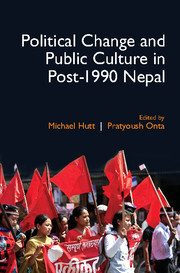Book contents
- Frontmatter
- Contents
- List of Figures
- Introduction Political Change and Public Culture in Post-1990 Nepal
- Part I Rumour
- Part II Ethnicity and Identity
- Part III Activist Cultures
- Part IV Gender and Resistance
- 9 Heroic Tales: Memoirs by Maoist Women
- 10 Motherhood Containers: Cantonments and the Media Framing of Female Ex-combatants in Nepal's Transition
- Part V Heritage
- Contributors
- Index
9 - Heroic Tales: Memoirs by Maoist Women
from Part IV - Gender and Resistance
Published online by Cambridge University Press: 23 July 2017
- Frontmatter
- Contents
- List of Figures
- Introduction Political Change and Public Culture in Post-1990 Nepal
- Part I Rumour
- Part II Ethnicity and Identity
- Part III Activist Cultures
- Part IV Gender and Resistance
- 9 Heroic Tales: Memoirs by Maoist Women
- 10 Motherhood Containers: Cantonments and the Media Framing of Female Ex-combatants in Nepal's Transition
- Part V Heritage
- Contributors
- Index
Summary
Introduction
The writing of memoirs centred around Nepal's ten-year conflict (2052–62 v.s., or 1996–2006) has been a popular literary trend in recent years. The writing and publication of such memoirs has accelerated since the signing of the Comprehensive Peace Agreement by the-then CPN (Maoist) and the Nepal government on 21 November 2006. Such war-centric memoirs help us understand the different dimensions of Nepal's ten-year-old conflict through the experience and perspective of the combatants themselves. Maoists see this war as the ‘people's war’ fought by the ‘people’ themselves for the ‘people’, and they are eager to express their stories of ‘honour’ and experience. The genre is dominated by male writers, who have various perspectives (including gender aspects to some extent), but these do not help one understand the experience, pain and perspectives of the women combatants.
A large number of women from diverse backgrounds assumed different roles in the conflict. The women were active in performing even those tasks that Nepali society holds as extraordinary for a woman to perform, and tasks that are usually considered to be the responsibility of men. Even women who were not involved on the war front shouldered the manly responsibilities of their household, and were in the public space outside their households once the conflict had scattered their male relatives (Gautam, Banskota and Manchanda, 2003, 93–94). Thus, some feminists think that the war dealt a strong blow to social norms that hold women as weak and always in need of protection (Acharya, 2068 v.s.). The objective of this chapter is to investigate memoirs by Maoist women in order to establish the extent to which the roles and experiences of the women involved in the war challenged established social norms.
Altogether, a total of 51 memoirs (including individually-authored and collected volumes) written by people involved in the Maoist war were published between 2005 and the summer of 2012; a number of these were published by their authors. Of these 51 memoirs, seven (six individually-authored and one collected volume) are by women.
- Type
- Chapter
- Information
- Political Change and Public Culture in Post-1990 Nepal , pp. 197 - 222Publisher: Cambridge University PressPrint publication year: 2016



